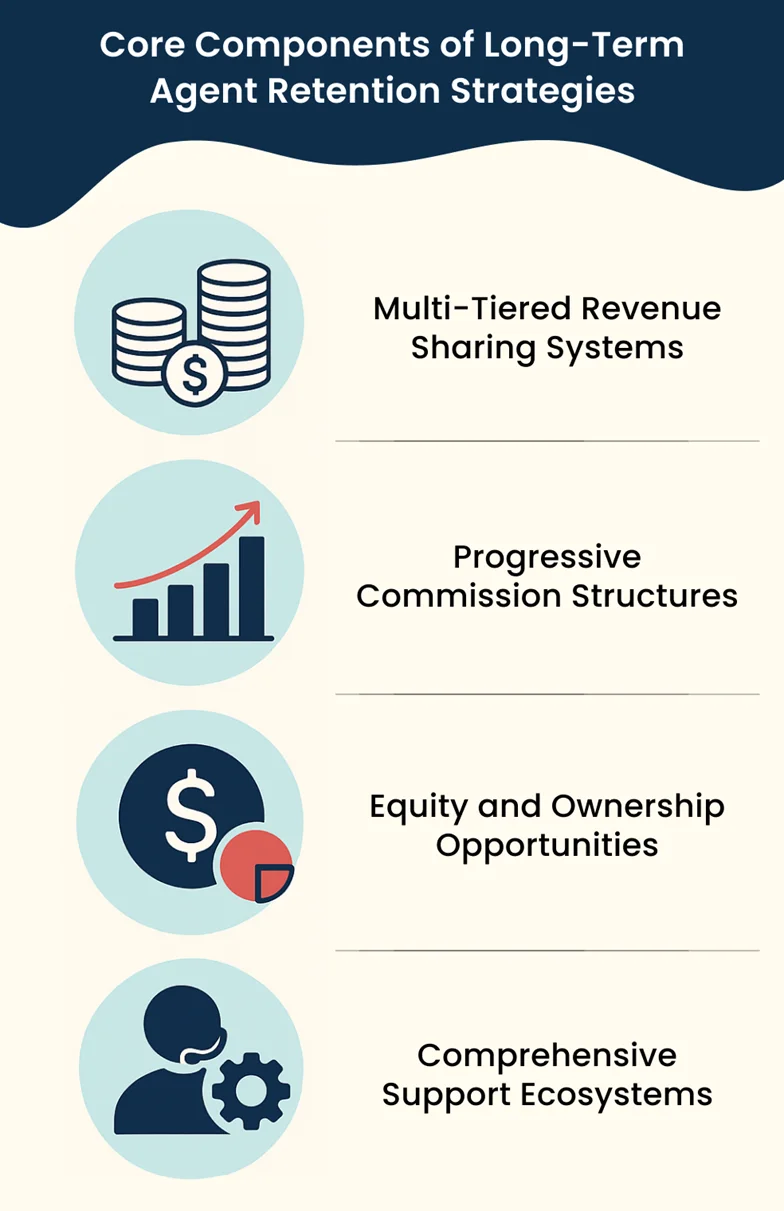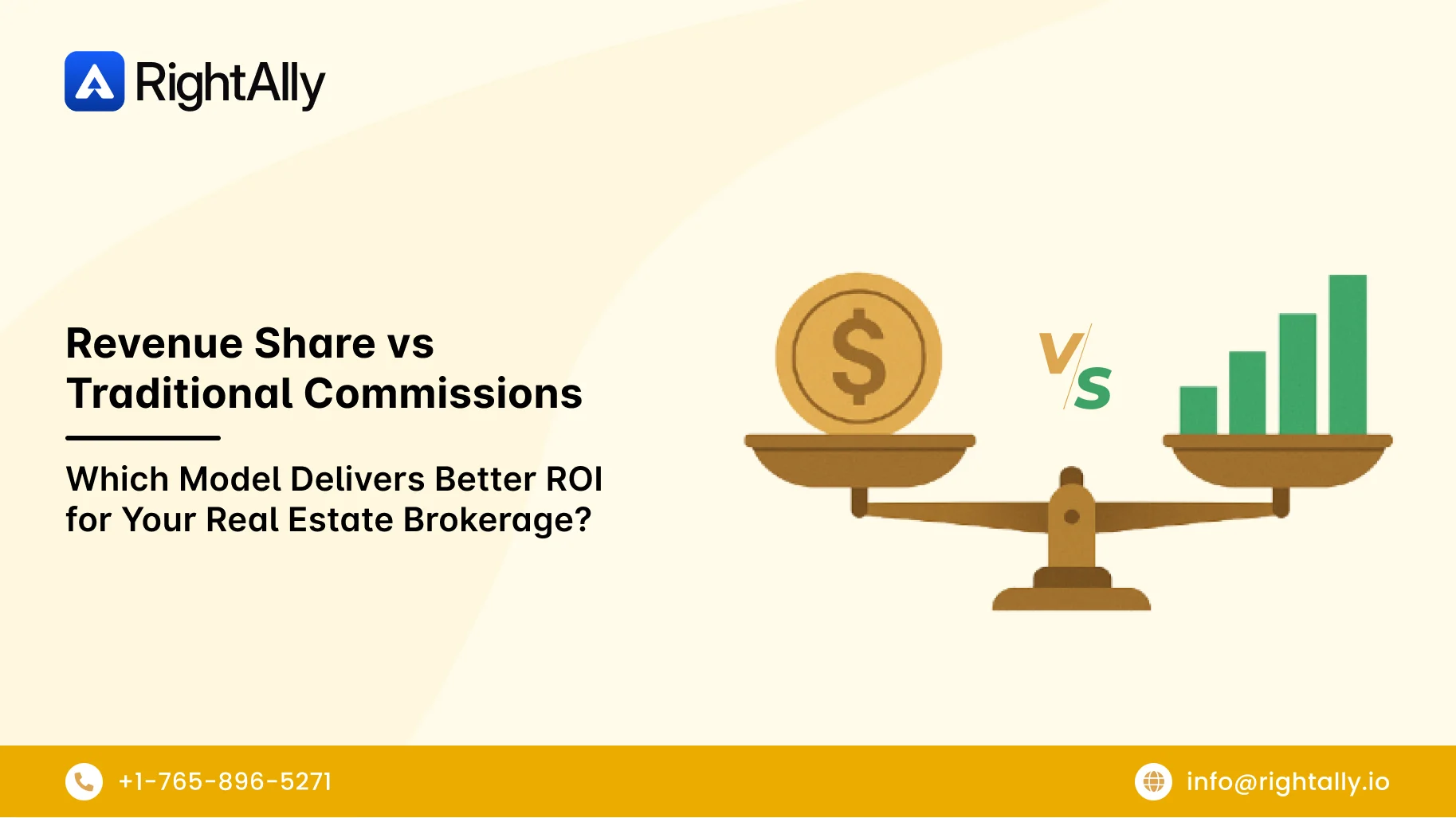Table of Content
Summary
This guide explores the best compensation strategies to retain real estate agents long term. Learn what agents value most in a compensation plan, the core components of effective retention strategies, and how to design a plan that motivates and keeps top talent in your brokerage.
According to the National Association of Realtors (NAR), 88% of home purchases in 2024 were made via real estate agents. Only 5% of people purchased directly from the previous owner. In other words, the real estate value chain cannot do without agents. And what happens if these high-producing agents are fairly compensated? They gravitate towards your brokerage in droves.
The REAL Brokerage, for instance, added approximately 10,000 agents by Q4 2024, bringing its total to 24,140 agents. The cloud brokerage's long-term agent retention and stellar agent growth led to improvement in nearly every business metric of the cloud brokerage firm.
The good thing is that you can replicate this model at your brokerage as well. All you need is a great compensation strategy for real estate agents. Growth and superior long-term agent retention will follow.
So, without further ado, let's get your real estate agent retention on track.
What Real Estate Agents Value in a Compensation Plan?
Since you have to develop an agent-centric compensation plan, it's best to first understand what drives agent loyalty. After all, recent changes have fundamentally altered what agents prioritize in their compensation packages.
1. Transparency and Adaptability in a Post-NAR World
The August 2024 implementation of new NAR settlement rules has tightened the agent compensation structure. One of the most impactful changes is the mandatory requirement for written buyer agreements, which has altered how agents engage with prospects.
Additionally, the ban on Multiple Listing Service (MLS) commission offers means agents now operate with even tighter margins. Industry projections suggest that commissions could drop by 25–50% in the aftermath of the NAR settlement.
In this backdrop, agents are prioritizing compensation plans that offer clarity and flexibility across varying transaction types.
2. Income Stability in an Uncertain Market
It's not as if everything was pink before the NAR settlement. The traditional feast-or-famine nature of real estate commissions drove much of the industry's retention problems. Many of the tribulations come from the lack of financial security.
To put things into perspective, the median gross income from real estate activities fell from $56,400 in 2022 to $55,800 in 2023. This drop becomes more pronounced when you consider that the agents are living paycheck to paycheck with stretched credit card bills. Often, they have to settle for a sub-optimal deal just to make ends meet.
So, compensation models that provide reliable income streams with performance incentives are valued more by high-producing agents.
Data reveals that 35% of agents operate under fixed commission splits, 20% use graduated structures, and another 20% follow capped commission models. However, the most successful retention strategies integrate base compensation elements (health insurance, technology stipends, or guaranteed minimums) with traditional commission structures.
3. Long-Term Wealth Building Opportunities
Top-performing agents no longer view real estate as just a job. They want career-building opportunities that create lasting wealth. This includes equity participation, revenue sharing from recruitment activities, and ownership pathways within their brokerages.
The success of revenue-sharing models demonstrates this trend clearly. eXp Realty has distributed over $889 million in revenue share earnings since 2015, highlighting the growing appeal of alternative compensation structures.
In 2023 alone, approximately $198 million paid out in 2023 alone. These programs create passive income streams that bind agents to their brokerages while rewarding them for contributing to company growth.
Core Components of Long-Term Agent Retention Strategies

Now, let's understand what elements can help you build your real estate agent compensation plan around the wants and needs of agents.
Here are a few factors that a successful real estate agent pay structure often combines:
1. Multi-Tiered Revenue Sharing Systems
Revenue sharing model is one of the most powerful retention tools available to modern brokerages. REAL's five-tier system exemplifies this approach, paying Tier 1 sponsors 5% of their recruit's commission up to $4,000 annually, with differential commission slabs for subsequent tiers.
This solves a lot of problems for the agents. Firstly, they are no longer dependent exclusively on their sales, as a productive downline helps them during their "in-between" period of deals. Secondly, it creates a meaningful incentive to hire and train agents, thereby eliminating the associated risk of operating on their own.
However, successful revenue sharing requires strategic guardrails to ensure sustainability. For instance, REAL necessitates its agents to stay active and close a minimum brokerage revenue of $450 over six months (rolling period) to be considered productive. This policy is a prerequisite for agents to earn revenue-sharing benefits. It also helps prevent pyramid-style schemes and rewards active contributors. This approach also creates a healthy ecosystem where revenue sharing enhances rather than replaces primary commission income.
eXp Realty further demonstrates the scalability of this model, with the company sharing 50% of its total company dollars through revenue-sharing programs. The key lies in creating transparent calculation methods and sustainable percentages that support long-term payouts without compromising brokerage profitability.
2. Progressive Commission Structures
The most effective compensation plans reward performance, experience, and loyalty. You can have competitive starting splits of 70/30 to 80/20, comprehensive mentorship programs, and reduced fees during the initial learning period. This helps them to get much-needed time to know the ropes.
Then, for developing professionals, a graduated commission increase works well. For instance, if an agent hits some milestone like a $12,000 cap, they can enjoy 95% to 100% commission splits. Case in point is eXp Realty's capped commission model. Agents pay an 80/20 split up to a $16,000 cap, after which they retain 100% of commissions. Such qualifications can be based on production milestones, access to advanced training, and the ability to bring in more agents.
Lastly, for the top-tier agents, you can have premium commission splits or capped models, stock participation opportunities, and leadership roles.
Overall, your commission structure should provide clear financial incentives for agents to increase their production while building long-term loyalty.
3. Equity and Ownership Opportunities
Modern agents increasingly demand ownership stakes in the brokerage's success. eXp Realty's ICON Agent Program offers up to $16,000 in stock awards for achievement milestones, creating tangible wealth-building opportunities beyond traditional commissions.
Profit-sharing arrangements, like Keller Williams' model of distributing market center profits monthly, align agent success with brokerage performance. These programs transform agents from service providers into true business partners, fostering the deep loyalty necessary for long-term retention.
4. Comprehensive Support Ecosystems
Compensation alone doesn't drive retention. The supporting infrastructure matters equally. Successful retention strategies integrate financial incentives with comprehensive support systems, including advanced CRM platforms, transaction management tools, marketing automation, and virtual training programs. This holistic approach addresses the professional development needs that drive long-term career satisfaction.
How to Build a Compensation Strategy that Helps Retain Real Estate Agents Long Term?
Creating an effective retention strategy requires systematic planning and continuous adaptation to changing market conditions. The following framework provides a roadmap for building sustainable compensation programs:
Step 1: Conduct Comprehensive Market Analysis
Before designing compensation structures, analyze your competitive landscape thoroughly. Research local and national commission split averages, study revenue-sharing programs offered by competitors, and understand your regional agent density.
Benchmark against industry leaders like eXp Realty and REAL Broker to understand how innovative compensation structures can drive your growth. However, avoid copying models wholesale. Instead, identify principles that align with your brokerage's unique market position and growth objectives.
You can even take the help of our experts on a free 15-minute interaction. They've helped scale multiple brokerages across the states with a revenue share model and will point you in the right direction.
Step 2: Design Performance-Based Progressive Frameworks
Implement compensation structures that reward both immediate performance and long-term commitment. Start with competitive base splits that match or exceed local standards, then layer in graduated systems providing clear pathways to 90%+ commission retention.
Consider REAL Broker's approach of limiting revenue sharing to actively producing agents ($450+ in brokerage revenue over six months) while offering a six-month grace period for recruits. This balance ensures participants contribute value while supporting new agent development.
Step 3: Integrate Technology and Automation
Leverage commission management software to automate calculations, reduce disputes, and provide real-time earnings tracking. Platforms that integrate with existing CRM systems streamline operations while improving transparency, a critical factor in agent satisfaction.
Automated systems also enable more sophisticated compensation models. Real-time tracking of production milestones, revenue sharing calculations, and equity award eligibility removes administrative friction that often undermines complex compensation programs.
Step 4: Establish Continuous Feedback Mechanisms
Regular communication prevents small issues from becoming departure triggers. Implement monthly one-on-one meetings, quarterly performance reviews, and annual compensation assessments. Acquiring new agents costs you more than retaining existing ones. Retaining existing agents, on the other hand, has other added benefits like retaining institutional knowledge and improved customer relationships.
Create agent advisory committees for compensation structure input. Also, conduct exit interviews for departing agents to identify improvement opportunities. This feedback loop ensures your compensation strategy evolves with changing agent needs and market conditions.
Step 5: Monitor and Optimize Performance
Track key performance indicators, including agent tenure (aiming to exceed the six-year industry average), revenue per agent, turnover rates, and agent satisfaction scores. Use this data to make informed adjustments to compensation structures and support systems.
Quarterly compensation structure reviews and annual competitive analysis ensure your programs remain competitive. Remember that brokerages promoting work-life balance and flexible schedules show significantly improved retention rates. Compensation strategies must address cultural factors alongside financial incentives.
Conclusion
The brokerages that thrive in today's challenging market understand a fundamental truth: exceptional agent retention requires more than competitive commission splits. It demands a comprehensive compensation strategy that addresses the diverse needs and aspirations of modern real estate professionals.
The future belongs to brokerages that align agent success with company growth, creating sustainable ecosystems where shared prosperity drives mutual success.
Need Help Figuring Out Your Compensation Structure?
Finding the right compensation structure that your agents love without upsetting your growth or business viability is tough. But that’s what we excel in.
Frequently Asked Questions
Retention in real estate means a brokerage’s ability to keep agents loyal and engaged over time.
As per NAR via REALTOR® Magazine, about 50% of agents leave the industry within two years. Brokerages can improve retention by offering strong training, mentorship, fair compensation structures, and supportive work environments that encourage long-term loyalty.
The NAR settlement has tightened agent compensation structures by requiring written buyer agreements and banning MLS commission offers, potentially reducing commissions by 25–50%.
Revenue sharing in real estate allows agents to earn a portion of the brokerage’s revenue by sponsoring and supporting other agents, creating passive income tied to team performance and company growth.
The most common payment method for real estate salespeople is a commission, typically a percentage of the property's sale price, paid upon closing. Nowadays, the revenue share model is also growing as an alternative, giving agents additional income opportunities beyond traditional commissions.
The long-term outlook for a real estate agent depends on their ability to adapt to industry changes, with those leveraging new compensation models and technology likely to find sustained success.
Popular topics
Efficiency
Growth
Compliance
Technology
Agents
Trends



